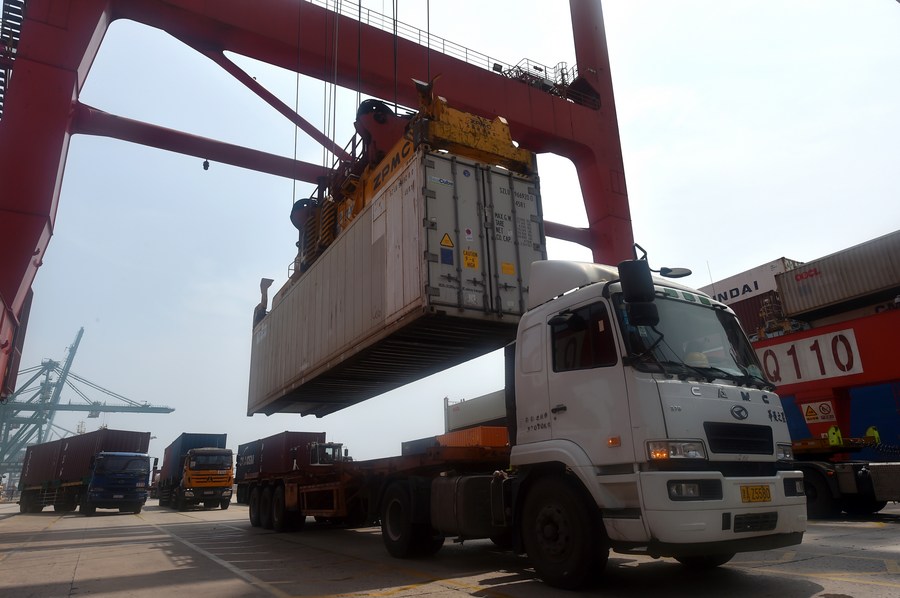Xinhua Headlines: China improves business environment to spur economy
 0 Comment(s)
0 Comment(s) Print
Print E-mail Xinhua, 08 10, 2020
E-mail Xinhua, 08 10, 2020
-- China is unswervingly improving its business environment, nurturing fertile ground for the growth of various companies and injecting vitality into the domestic and global economy.
-- Local authorities have taken a slew of measures to help businesses tide over the uncertainties caused by the COVID-19 epidemic.
-- According to a World Bank report, the proliferation of e-government services is one of the key factors driving China's success in improving the business environment.
SHANGHAI, Aug. 7 (Xinhua) -- Despite the COVID-19 epidemic, new headquarters, factories and industrial projects of various international giants as well as local small and medium-sized enterprises (SMEs), have been mushrooming across China.
The world's second-largest economy is unswervingly improving its business environment, nurturing fertile ground for the growth of various companies and injecting vitality into the domestic and global economy.
WIDER OPENING-UP COMMITMENT
U.S. agribusiness giant Cargill on Wednesday announced the opening of the Asia Pacific headquarters of its agricultural supply chain in Shanghai, further demonstrating the company's continued commitment to China's market.
"We are grateful for the strong support from the Shanghai municipal government with this strategic location," said Robert Aspell, president of Asia Pacific for Cargill. He added that Shanghai would play a crucial role in the company's efforts to better serve customers in both China and other parts of the Asia Pacific region.
"We will unswervingly welcome international enterprises and investors to invest and run business in Shanghai. We will create a world-class business environment and expand development space for all enterprises," said Gong Zheng, mayor of Shanghai, during a video call with Cargill.

A woman shops at Hongqiao Import Commodity Exhibition and Trade Center in Shanghai, east China, April 25, 2020. (Xinhua/Fang Zhe)
Despite the COVID-19 epidemic, foreign investors have increased their investment in Shanghai in a bid to cash in on the business opportunities in China. The city received 10.28 billion U.S. dollars in foreign investment in the first half of 2020, up 5.4 percent year on year.
While foreign businesses beef up presence in the Chinese market, domestic firms have accelerated business resumption as the epidemic waned.
Tianjin Golden Wheel Bicycle Group Co., Ltd saw its exports in the first half of 2020 recover to the level in the same period last year.
"China continues to create an open, fair, just and non-discriminatory business environment, offering more opportunities to the world, thus helping stabilize the unsettled global economy amid the COVID-19 pandemic. This is a key factor for global companies to find the Chinese market attractive," said Quan Heng, secretary of the leading Party members' group at Shanghai Federation of Social Science Associations.
COMPREHENSIVE AND TARGETED REFORMS
According to the World Bank's Doing Business 2020 report, China made significant progress in the 2005-2020 period, compared to any other large economy in terms of facilitating the ease of doing business.
"We were happy to see measures including trimming the negative list, optimizing business environment and strengthening intellectual property protection," said Ker Gibbs, president of the American Chamber of Commerce Shanghai.
Since 2018, Shanghai has taken 286 targeted measures to improve the business environment, unveiling more than 70 reform policies and launching over 20 new public service systems, according to the municipal government.
Reforms have also been adopted in other parts of the country.
"Since Tianjin implemented the 'shipside delivery' reform to reduce customs clearance time, a container of imported goods can be picked up within three hours, saving some 300 yuan (about 43 U.S. dollars) per day," said You Tingguang, manager with a Tianjin-based trading company.

A crane loads a container onto a truck at Tianjin port container terminal in Tianjin, east China, Aug. 4, 2020. (Photo by Zhao Zishuo/Xinhua)
Local authorities have also taken a slew of measures to help businesses tide over the uncertainties caused by the epidemic. According to the Tianjin Golden Wheel Bicycle Group Co., Ltd, as 10 customs authorities have piloted cross-border B2B e-commerce exports nationwide, the company received approval for doing business within a day, thereby buying it more time to seize business opportunities during the epidemic.
"We have also received subsidies for water, electricity consumption and employment stabilization, as well as low-interest loans to help ease operation costs," said the group's general manager Yang Yufeng.
TECHNOLOGY DRIVER
According to the World Bank report, the proliferation of e-government services is one of the key factors driving China's success in improving the business environment.
Wang Qingyuan, 30, who owns a hair parlor, found it far more convenient than before when she recently applied to cancel the license of her shop's old address.
Upon reaching the government service center at Beijing's Daxing District, she logged into a mobile app through Alipay. The app ran facial recognition using her cellphone camera, enabling the staff to check all her information instantly.

A staff member helps a citizen deal with affairs at the government affairs service center of Daxing District in Beijing, capital of China, May 22, 2020. (Xinhua)
Corporate information and certificates can now be checked online as they are digitally stored. Besides, with the application of blockchain technology, one cannot tamper with the data, thus assuring authenticity.
In Beijing, some 140 e-government service centers have adopted blockchain technology, which can reduce paper use by an average of 40 percent.
Shanghai officially launched a comprehensive portal for administrative services in October 2018, which applied technologies such as blockchain, AI and big data.
Since its launch, the service has registered more than 29 million individual users and 2 million legal person users. The portal has handled over 60 million cases.
"China leads the world in the application of blockchain technology," said Huang Zhen, a professor with the Central University of Finance and Economics. "The technology is widely used not only in the financial sector but also in government services, which has become a key driving force for improving the business environment."
(Reporting by Chen Aiping, Li Meng, Zhang Yuqi, Xu Xiaoqing, Ni Yuanjin, Wang Junlu, Luo Xin, Wang Jinghuai and Li Baojie; Video reporters: Pan Xu, Chen Jie and Di Chun; Video editor: Jia Xiaotong)■


